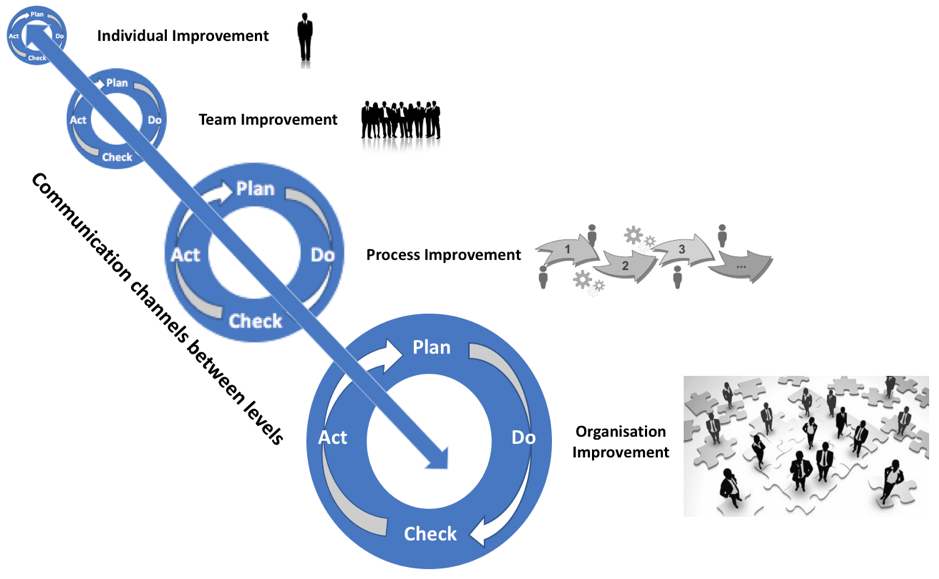Creating Organizational Cultures of Learning – Linked Learning Loops
23 March 2018“The trouble with us is that we’ve got no corporate memory.”
I’ve heard this statement in various forms from a variety of different people I’ve worked with over the years. The starkest version came from a senior officer in a police force. He was referring to the fact that his organization kept trying new improvement initiatives, which would never fully achieve their potential. The projects made mistakes, progress stalled and the initiative would ultimately fade away into insignificance. Then, after a few years, something similar would be instigated, with no attempt to first understand why things didn’t work previously and put mechanisms in place to prevent them happening again.
A critical element of the problem is that even though an organization keeps making the same mistakes that doesn’t mean its employees have forgotten what those errors were. As the senior officer recounted, he remembered what did and didn’t work – it was the organization that didn’t. The ultimate result? A negative organizational culture hostile to change.
Many academics have sought to address this problem. Peter Senge, for example, in his book The Fifth Discipline highlights the importance of being a learning organization. One that is constantly open to new ideas and innovation, and builds upon experience to become quicker, smarter and more knowledgeable. He suggests five different elements of a learning organization: systems thinking; personal mastery; mental models; building a shared vision; and team learning.
He is, of course, not the only voice to suggest that learning is key to success. W. Edwards Deming and Walter A. Shewhart introduced the ‘four-step management method’ to business in the early twentieth century. We can recognise this process as a ‘scientific’ approach to work.

- Plan: What do we want to change
- Do: Make the change
- Study/check: Did it achieve what we wanted?
- Act: If it did make sure that everyone benefits and embed the learning. If it didn’t, what should we try next time?
If discipline is applied to the process, the organization ‘learns’.
Data is the key driver of this scientific process. Much of what many improvement methodologies offer, including Lean, Six Sigma and Agile, is mechanisms to collect, analyse and interpret information and data, so that managers can see what is happening, make a change and learn. Steven Spear and H. Kent Bowen are very specific about what this involves in their paper Decoding the DNA of the Toyota Production System. They talk about organizational learning taking place “at the lowest level” by those who do the work, under the guidance of a teacher, preferably using the Socratic method.
In my work, I see too many organizations that have put insufficient focus, effort, time and space into this learning process. The organization understands (to varying degrees) that it needs to worry about its end-to-end processes and ultimately to keep improving them, but it often forgets about ‘creating an improvement process’ within which to examine the work process.
Critically, an improvement process is needed not only at a process level but at a team level, and even at an individual level. Above these levels of improvement, the organization itself needs to examine how it works as a system, and improve how it sees and manages itself, how it learns.
I’ve tried to illustrate this concept in the graphic below, using the scientific ‘Plan, Do, Check, Act’ cycle as an iterative loop of learning, which must occur at different levels and scales.

What’s important is that there is a formalised improvement process for each of the levels. That each level is given time within their working day/week/month to engage within the improvement process and that they understand how to use the relevant improvement tools within each level. One of the most important features of this layered approach to organizational improvement is that there is an actual process of communication between the levels. For example, if a team is experiencing difficulties with an element of work, then they should have the time and tools to scientifically work out what is going wrong and a communication channel to discuss problems with individuals. If, however, the trouble is occurring outside of the team, then they should know how to ‘kick up’ the investigation of that problem to the ‘process’ level. Too often improvement, and therefore learning, happens in isolation and not part of a connected system of organizational change.
Thinking about companies in this way enables managers to appreciate that it’s not enough to simply manage processes of work. They must also manage processes of improvement and learning.
Comments
- Lifetime Loyalty and Taylor Swift
- Looking at Things Differently
- Networking Noodles
- Addicted to Truth
- Designs on Service Design
- The Multiple Joys of Universal Design
- Hungry Cultures
- Event Lean
- The Traffic Analogy
- Moving on Up
- Rosé Cava Revolution?
- Powerpoint Sneaky Lean
- Writing about Writing
- ChatGPT Response: Exploring the Art of Expression: Unveiling the Magic of Writing in the Style of Sarah Lethbridge
- Help to Grow Coldplay Style
- Caring IS Everything!
- Institutional Flapping
- “Just Do the Next Right Thing”
- Trust Thermoclines
- Organisational Tempo
- The Inaugural Lethbridge Customer Service Awards
- Vaccine Lean – The Dawn of the Water Spider
- The Queen and Lean
- Decisions, Decisions, Decisions
- Peaceful Protest
- Tesla Tales
- Back to Reality!
- Carrots, Sticks and Buckets of Time Tricks
- The Great Pandemic Pause
- Organisational Therapy
- Late Night Wordleing
- Vaccine Lean
- Chief Letters of Complaint Officer
- AMBAZING Accreditation!
- My Big Lean Head
- [Let us] Help [you] to Grow: Management
- The Love Island Blog
- More Haste, Less Speed
- The Power of Persistence
- Brain Training
- July 2024 (1)
- June 2024 (1)
- May 2024 (1)
- March 2024 (1)
- February 2024 (2)
- December 2023 (2)
- October 2023 (2)
- September 2023 (1)
- July 2023 (3)
- June 2023 (1)
- May 2023 (1)
- April 2023 (1)
- March 2023 (1)
- February 2023 (1)
- January 2023 (1)
- November 2022 (1)
- October 2022 (2)
- August 2022 (2)
- July 2022 (1)
- May 2022 (2)
- April 2022 (1)
- February 2022 (1)
- January 2022 (1)
- December 2021 (2)
- November 2021 (1)
- October 2021 (1)
- September 2021 (1)
- August 2021 (1)
- July 2021 (1)
- May 2021 (2)
- April 2021 (1)
- March 2021 (1)
- January 2021 (1)
- December 2020 (1)
- October 2020 (3)
- August 2020 (1)
- June 2020 (2)
- April 2020 (1)
- March 2020 (1)
- February 2020 (1)
- December 2019 (2)
- October 2019 (1)
- September 2019 (1)
- August 2019 (1)
- July 2019 (1)
- June 2019 (1)
- February 2019 (3)
- October 2018 (1)
- September 2018 (1)
- March 2018 (10)
- April 2016 (1)
- January 2015 (3)
- July 2014 (9)
- September 2013 (1)

1 comment
Comments are closed.